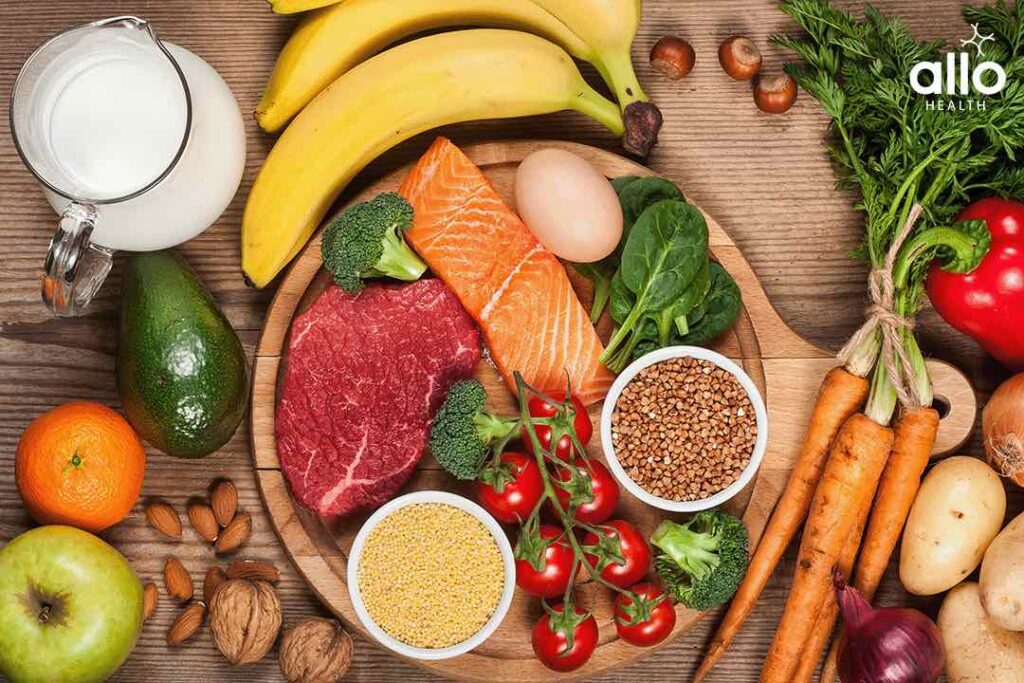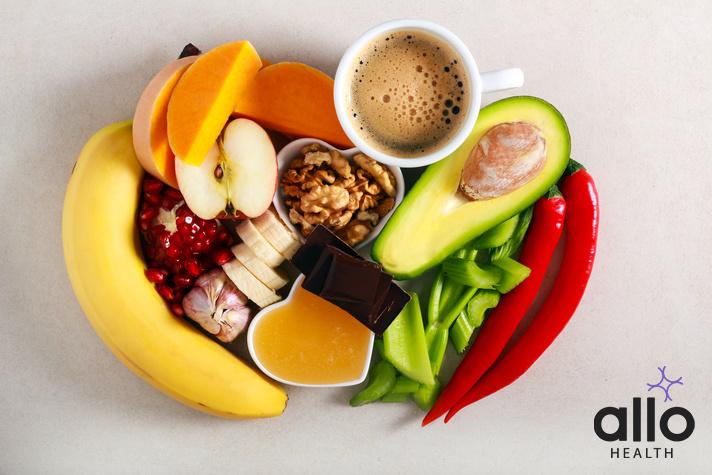Erectile Dysfunction and Diet: Foods to Avoid

Allo Health is dedicated to personalized well-being, offering support and trusted information tailored to individual health goals. The platform emphasizes human-generated content, led by a distinguished medical team of experts, including physicians and sexual health specialists. Their commitment to credibility involves rigorous fact-checking, authoritative research, and continuous updates to ensure accurate, up-to-date information. Allo Health's unique approach goes beyond conventional platforms, providing expert-led insights and a continuous commitment to excellence, with user feedback playing a crucial role in shaping the platform's authoritative voice.

A psychologist with clinical specialization and experience working with sub-clinical and clinical populations. Her areas of interest and expertise include anxiety-related disorders, mood disorders, psychotic disorders, addictions, sexual health and wellness, relationship issues, stress, and geriatric mental health.
Why This Was Upated?
Our experts continually monitor the health and wellness space, and we update our articles when new information became available.
Updated on 16 April, 2024
- Article was updated as part of our commitment to diversity, equity, and inclusion.

"The following blog article discusses food and diet-related information for general educational purposes. However, it is important to note that the information provided is not intended as personalized dietary advice and should not be considered a substitute for professional guidance from a registered dietitian or qualified healthcare professional. Before making any significant changes to your diet or nutrition plan, it is recommended to consult with a registered dietitian or healthcare professional.
Book consultation
Dietary changes can have a significant impact on your overall health and well-being. It is important to approach any changes to your diet in a balanced and sustainable manner, ensuring that you meet your nutritional needs and avoid any potential nutrient deficiencies. Rapid or extreme changes in dietary patterns can be detrimental to your health and may require professional guidance.
It is crucial to note that any specific dietary recommendations or guidelines mentioned in this article may not be appropriate for individuals with specific medical conditions, allergies, or intolerances. A registered dietitian or healthcare professional can provide individualized advice, including modifications or alternative food choices to accommodate your unique circumstances.
The information provided in this article may not encompass all possible dietary considerations or account for the latest research and nutritional guidelines."
Erectile dysfunction (ED) can be frustrating and embarrassing for many individuals. While there is no single food that can guarantee the prevention of ED, incorporating certain foods into your diet may help reduce your risk of developing ED. Fruits and vegetables high in antioxidants, nuts and seeds with healthy fats, whole grains for regulating blood sugar, fatty fish rich in omega-3s, and pomegranates with high levels of antioxidants are some of the foods that have been shown to benefit sexual health and potentially decrease the likelihood of ED. Maintaining a balanced diet, coupled with a healthy lifestyle, can go a long way in promoting sexual health and avoiding ED.
Erectile Dysfunction
Erectile dysfunction refers to having difficulty in achieving or maintaining an erection firm/hard enough for sexual intercourse all or most of the time.
The symptoms of erectile dysfunction (ED) can include:
- Difficulty getting an erection
- Difficulty maintaining an erectio
- Difficulty maintaining an erection
- Reduced sexual desire
- Troubles with sexual performance
- Anxiety or depression related to ED
Potential Causes Of Erectile Dysfunction
There are many possible causes for erectile dysfunction (ED), which can be physical, psychological, or a combination of both. Some common causes include:
- Cardiovascular diseases: Atherosclerosis, heart disease, high blood pressure, and other conditions that restrict blood flow to the penis can make it difficult to achieve and maintain an erection.
- Neurological conditions: Conditions such as multiple sclerosis, Parkinson’s disease, and spinal cord injuries can affect the nerves that control erections.
- Hormonal imbalances: Low testosterone levels, the primary male sex hormone, can contribute to ED.
- Medications: Effects of medication, such as antidepressants, antihistamines, and blood pressure medications, can cause ED as a side effect.
- Psychological factors: Anxiety, depression, chronic stress, and relationship concerns can all contribute to ED.
- Lifestyle factors: Smoking, excessive alcohol intake, lack of sleep. obesity or excess weight gain and lack of physical activity can all contribute to ED.
- Other factors: Trauma to the pelvic area or penis, Peyronie’s disease, or certain surgeries can also contribute to ED.

Common Treatment Options For Erectile Dysfunction
Fortunately, there are several treatment options available for ED. The type of treatment recommended will depend on the underlying cause of the ED.
- Medications To Increase Blood Flow: For physical causes, medication such as phosphodiesterase PDE5 inhibitors (PDE5i) like Sildenafil and Tadalafil may be prescribed; these drugs help increase blood flow to the penis and improve erectile function.
- Erection Devices And Penile Implants: In some cases, vacuum erection devices or penile implants may be recommended. These are mechanical devices that can help achieve an erection.
- Therapy And Psychological Counselling: For psychological causes, therapy and counselling may be recommended to help with underlying concerns such as stress, anxiety, or depression.
- Lifestyle Changes: Quitting smoking, maintaining a healthy diet, regular exercise, and managing stress can also help improve ED.
It is important to consult with a medical professional to determine the best treatment option for you. With the right treatment, many individuals are able to improve their sexual function and regain their quality of life.
How Does Food Actually Help With The Prevention Of ED?
Now, this factor hugely depends on the severity of the ED. But it has generally been observed that changes in health and lifestyle along with improvements in health conditions will help in a long-lasting positive impact on your sex life and avoid the symptoms of ED to a very large extent.
What Kind Of Food Should One Avoid?
Although all type of food is necessary to maintain a healthy balanced diet, these are some of the food items you must avoid as much as possible.
Fatty Foods
Intake of saturated animal fats and cholesterol in too much quantity can negatively impact your heart by contributing to atherosclerosis. Atherosclerosis is actually a condition in which fatty deposits accumulate along artery walls, causing the arteries to narrow and increasing the risk of heart attack and stroke. This not only affects your heart but also affects your capability to maintain an erection.
Refined Sugar
Over-consumption of sugar-sweetened beverages and other sugary foods is directly linked to body weight, and it shows a huge impact on BMI. These conditions lead to obesity and an increase in the BMI.
Not only does excess sugar consumption add to obesity, but it also leads to increased blood sugar levels, which affects your ability to achieve and maintain an erection.
Not only this but sugar consumption can alter your leptin levels, which could impact your sex drive. Leptin, also known as the hunger hormone, transmits a signal to the brain when the stomach is full.

Alcohol
Excessive alcohol consumption has negative impacts and can lead to catastrophic impacts on health. One of these is catalyzing the ED. Excessive consumption of alcohol has the potential to make ED worse.
Recent reports have shown that 72% of men who consume alcohol have at least one or more sexual dysfunction disorders including premature ejaculation (PE), ED, or decreased sex hormone levels.
Too much alcohol leads to a reduction in sensation, which directly affects the penis and hinders the ability to develop or maintain an erection.
What Food Should You Be Adding To Your Diet?
There are certain foods that can help reduce the risk of erectile dysfunction. These food types include:
Flavonoid-Rich Foods
Flavonoids are a type of antioxidant found in many fruits, vegetables, and other plant-based foods. Research suggests that flavonoids may help with healthy blood flow, reduce oxidative stress, and improve cardiovascular health, which can reduce the risk of ED. Some flavonoid-rich foods include:
- Berries: Berries such as blueberries, strawberries, and raspberries are high in flavonoids and have been shown to improve blood flow and reduce oxidative stress. Fruits and vegetables are high in antioxidants and vitamins.
- Dark chocolate: Dark chocolate contains high levels of flavonoids and has been shown to improve blood flow and reduce oxidative stress.
- Citrus fruits: Citrus fruits such as oranges, lemons, and limes are high in flavonoids and have been shown to improve blood flow and reduce oxidative stress.
- Green tea: Green tea is high in flavonoids and has been shown to improve blood circulation and reduce oxidative stress.
- Red wine: Red wine is high in flavonoids and has been shown to improve blood circulation and reduce oxidative stress.

Mediterranean Diet
The Mediterranean diet, which is rich in fruits, vegetables, whole grains, fish, and healthy fats like olive oil, has been shown to have numerous health benefits, including reducing the risk of ED.
- Nuts And Seeds: Nuts like almonds and seeds like flaxseeds contain healthy unsaturated fats that can help improve blood flow and reduce inflammation.
- Whole Grains: Whole grains are a good source of fibre and can help regulate blood sugar levels and reduce the risk of type 2 diabetes, which is a risk factor for ED.
- Fish: Fish like salmon and tuna are high in omega-3 fatty acids, which can improve blood flow and reduce inflammation.
- Pomegranates: Pomegranates contain high levels of antioxidants and have been shown to improve blood flow and reduce oxidative stress.
Even though this might not be enough to totally prevent ED, this acts as a basic precaution to avoid ED and its symptoms as much as possible. Maintaining a balanced diet, coupled with a healthy lifestyle, plays a crucial role in promoting sexual health and avoiding ED.
Most Asked Questions
-
What foods should I avoid to prevent erectile dysfunction?
Certain foods can contribute to ED by affecting blood flow and hormone levels. Avoid excessive consumption of processed foods high in trans fats, refined sugars, and refined grains, as they can impair circulation and lead to cardiovascular issues, a common cause of ED.
-
Are there specific types of fats that can worsen erectile dysfunction?
Yes, saturated and trans fats found in fried foods, red meat, and processed snacks can increase cholesterol levels and clog arteries, reducing blood flow to the penis. Opt for healthier fats like those found in nuts, seeds, avocados, and fish to support vascular health and potentially improve erectile function.
-
Should I limit my intake of sugary foods and beverages to prevent ED?
Yes, excessive sugar consumption can lead to obesity, insulin resistance, and diabetes, all of which are risk factors for erectile dysfunction. Minimize intake of sugary sodas, candies, pastries, and desserts, and focus on whole foods with natural sugars like fruits to help maintain stable blood sugar levels.
-
Do alcoholic beverages have an impact on erectile function?
Yes, alcohol can impair both physical and psychological aspects of sexual function. Chronic heavy drinking can damage the liver, disrupt hormone production, and lead to nerve damage, all of which can contribute to ED. Moderate alcohol consumption is generally considered safe, but excessive intake should be avoided.
-
Are there any specific dietary patterns or habits that may worsen erectile dysfunction?
Eating a diet high in sodium, such as from processed and packaged foods, can contribute to high blood pressure and vascular issues, which are linked to ED. Additionally, excessive caffeine intake can lead to anxiety and sleep disturbances, which may affect sexual performance. Adopting a balanced diet rich in fruits, vegetables, lean proteins, and whole grains while minimizing processed foods can help support overall health and potentially improve erectile function.







































